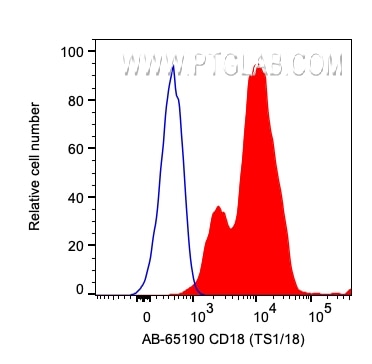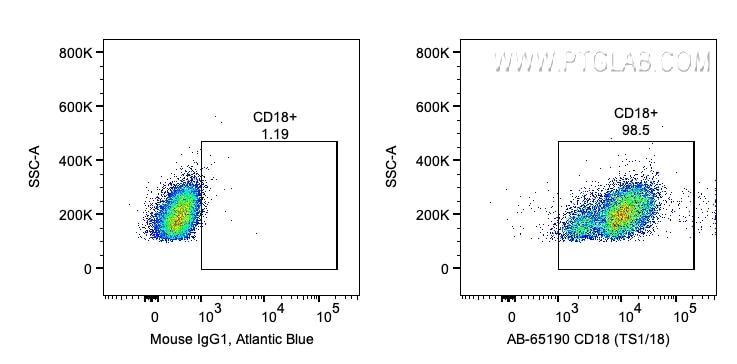Tested Applications
| Positive FC detected in | human PBMCs |
Recommended dilution
| Application | Dilution |
|---|---|
| Flow Cytometry (FC) | FC : 5 ul per 10^6 cells in 100 μl suspension |
| This reagent has been pre-titrated and tested for flow cytometric analysis. The suggested use of this reagent is 5 μl per 10^6 cells in a 100 µl suspension or 5 μl per 100 µl of whole blood. | |
| Sample-dependent, Check data in validation data gallery. | |
Product Information
AB-65190 targets CD18 in FC applications and shows reactivity with Human samples.
| Tested Reactivity | Human |
| Host / Isotype | Mouse / IgG1, kappa |
| Class | Monoclonal |
| Type | Antibody |
| Immunogen | Human Beta 2 Integrin Predict reactive species |
| Full Name | integrin, beta 2 (complement component 3 receptor 3 and 4 subunit) |
| Calculated Molecular Weight | 85 kDa |
| GenBank Accession Number | BC005861 |
| Gene Symbol | CD18 |
| Gene ID (NCBI) | 3689 |
| ENSEMBL Gene ID | ENSG00000160255 |
| RRID | AB_2935187 |
| Conjugate | Atlantic Blue™ Fluorescent Dye |
| Excitation/Emission Maxima Wavelengths | 404 nm / 458 nm |
| Form | Liquid |
| Purification Method | Protein G purification |
| UNIPROT ID | P05107 |
| Storage Buffer | PBS with 0.09% sodium azide and 0.5% BSA, pH 7.3. |
| Storage Conditions | Store at 2-8°C. Avoid exposure to light. Stable for one year after shipment. |
Background Information
CD18, also known as integrin beta-2, is a transmembrane protein that forms heterodimers with CD11a, CD11b, CD11c, CD11d (PMID: 1968349). CD11a/CD18 (LFA-1) is expressed by all leukocytes, while CD11b/CD18 (Mac-1) and CD11c/CD18 (p150,95) are normally restricted to expression on monocytes, macrophages, polymorphonuclear lymphocytes (PMNs), and natural killer cells (PMID: 1968349; 3109455; 10946284). CD18 plays an important role in mediating cell adhesion during immune response and defects of CD18 cause leukocyte adhesion deficiency (PMID: 3594570).
Protocols
| Product Specific Protocols | |
|---|---|
| FC protocol for Atlantic Blue™ CD18 antibody AB-65190 | Download protocol |
| Standard Protocols | |
|---|---|
| Click here to view our Standard Protocols |





